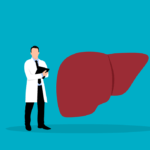Dr. Robert Lustig Speaking on Protecting the Liver and Feeding the Gut
Linsey Davis Our next guest is a paediatric neuroendocrinologist, who specializes in childhood obesity and diabetes, and a New York Times bestselling author. Doctor Robert Lustig looks to dispel many of the myths surrounding our health in his new book, “Metabolical,” delving into the allure and lies of processed food, nutrition, and modern medicine. Doctor Lustig, we thank you so much for joining us tonight.
Dr. Robert Lustig Thanks so much for having me. Appreciate being here.
Linsey Davis So, you dedicate much of your book to defining what healthy really means. Break that down for us. What does it mean for a food to be truly healthy?
Dr. Robert Lustig Well, the question is, what does healthy mean? You know, the FDA has a definition that has something to do with the number of calories, the amount of vitamin D, and the amounts of potassium and magnesium. The USDA doesn’t even offer a definition because if it did, then all of the foods would not be able to advertise that they were healthy.
So, what does healthy really mean?
After digesting all of the data and looking at all of the studies, I’m proffering two—count them, two—precepts to determine whether any given food is healthy.
- Number one: “protect the liver”
- Number two: “feed the gut”
Six words, two clauses, and it works.
Now, what do I mean by “protect the liver”?
Protect the liver from what? Well, protect the liver from the onslaught of simple sugars and carbohydrates, which drive insulin resistance and chronic Metabolical disease, the most notorious of which is sugar.Trans fats used to be an issue, but now sugar is probably the number one overloader of liver function.
Now, “feed the gut.” What does that mean?
It turns out we have 10 trillion cells in our body, but we have 100 trillion bacteria in our intestine. They outnumber us 10 to 1. Each of us is really a big bag of bacteria with legs. So, anything that increases the amount of nutrition going down further into the intestine will feed the gut. And I can sum that up in one word: fiber.
Fiber feeds the gut. And when you don’t give the gut the fiber it needs, the gut actually strips the mucin layer off your intestinal epithelial cells, denuding your intestine, and rendering you much more susceptible to chronic inflammation, insulin resistance, and, again, chronic disease.So, protect the liver, feed the gut.
Real food is low sugar, high fiber. Processed food is high sugar, low fiber. Real food is healthy, and processed food, for lack of a better word, is poison.
Linsey Davis So, we just saw an image of a mother and child in a grocery store. What are the first things that you’re filling up in your grocery cart when you go shopping? What kinds of foods and meals are you eating every day?
Dr. Robert Lustig Right. Everyone wants to know what I eat, and I will tell you right now that’s off-limits.
But having said that, what should be in people’s grocery carts are the foods that don’t have a label, and the reason is, that real food doesn’t need a label.
Real food doesn’t have a label.
In fact, real food is made by companies whose logos you’ve never seen, so you wouldn’t even know the label if you saw it. If you see a label on a package of food, you must consider that a warning label, because that means something’s been done to the food.
Real food doesn’t have a label because it doesn’t need one. If you’ve processed it in any way, shape, or form, then a label is required.
So, that tells you that something’s been done to the food. So, you can actually learn from the label how processed it is if you take the time to look at the ingredients.
Linsey Davis So, you’re suggesting the more ingredients it has, potentially, the more dangerous it is for your body?
Dr. Robert Lustig Without question. The foods that are best for you are the ones that come as single items around the edges of the grocery store. Ultimately, processed food is bad because it floods the liver and starves the gut.
Processed food is the single worst thing we can do for ourselves. Processed food is poison.
Linsey Davis and you write that not only is eliminating processed food good for your health, but that it can also fix many of the environmental challenges that we face. What does that look like?
Dr. Robert Lustig Absolutely. So, everyone’s worried about the cows because the cows make methane, and it’s true, the cows do make methane. But you know what?
They make five times the amount of methane today than they did 50 years ago.
The reason is because of the antibiotics that we’ve been giving the cows since they have to live on the CAFOs, [the Concentrated Animal Feeding Operations] in Kansas, because they’re not living on the farm anymore.
So because they’re living in close quarters and because they’re living with their manure all over the place. The breeders have to pump them full of antibiotics. Those antibiotics kill off their good bacteria, allowing the methane-producing bacteria to proliferate.
In addition, if you eat processed vegan food—like Coke, Doritos, Pepsi, Oreos—you’re spraying nitrogen onto those fields because the animals are not there to act as fertilizer. Now you have to use nitrogen fertilizer for those crops to grow.
That increases the amount of nitrous oxide, the nitrogen runoff, which is killing the Gulf of Mexico and all of our rivers, and also contributes to climate change because nitrous oxide has 33 times the heat-trapping capacity of carbon dioxide and lasts nine times longer in the atmosphere. So just because you’re eating plant-based food doesn’t mean you’re helping the planet.
Linsey Davis We have 30 seconds left with you, but what would your advice be for someone who is looking to take those first steps toward a healthier lifestyle?
Dr. Robert Lustig Eat real food.
Now, the problem is that real food right now costs more, and the reason is that we subsidize all the components of processed food—corn, wheat, soy, sugar. These subsidies make processed food cheaper.
The problem is, you may save money at the grocery store—and even that’s a question mark—but you will ultimately pay for it in terms of healthcare costs, a hundred times over. It is not a good deal.
Linsey Davis “Pay now or pay later,” as my grandmother used to say. Doctor Robert Lustig.
Dr. Robert Lustig You can pay the farmer, or you can pay the doctor.
Linsey Davis Oh, I love it. That’s a good way to put it, Doctor Robert Lustig. We thank you so much for your time and your insight.
Dr. Robert Lustig Thanks for having me.


